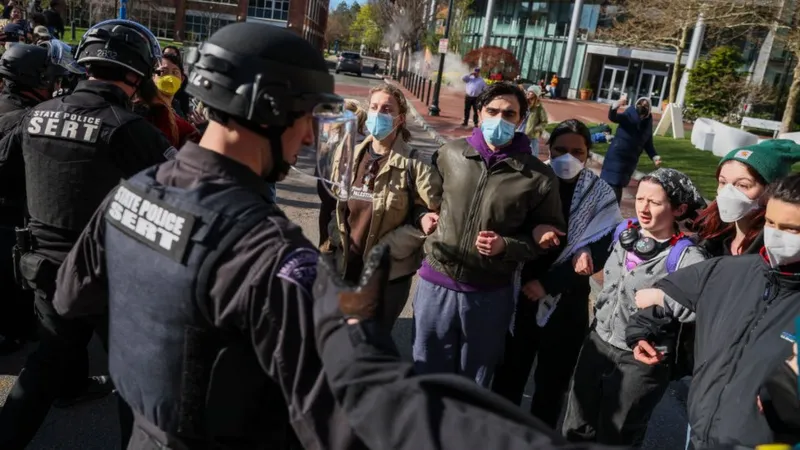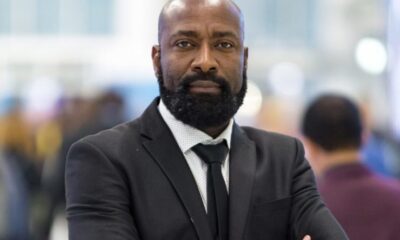Breaking News
Strict enforcement or accommodation? A story of two protests on US campuses
According to Ms. McAfee’s account to the BBC, she was witnessing a calm demonstration until the demonstrators started to move and the police arrived.

In less than 60 minutes, over 100 individuals—both students and non-students—were taken into custody, and numerous tents were either taken down or collapsed.
As state police officers in tactical gear removed their suspects, a sizable counter-protest emerged. There was conflict and mayhem throughout the scene.
Administrators at Northeastern University said that an anti-Semitic epithet had been heard, despite the demonstrators’ denial, and that outside infiltration “led to a clear escalation in tensions,” forcing them to contact the police.
With the US school demonstrations entering their second week, many colleges, like Northeastern, have decided to clamp down hard and rejected requests to withdraw from firms.
Columbia in New York broke up the first camp, rejected the requests of the demonstrators, and then threatened to suspend everyone involved. As a result of the increasing student response, officials threatened to expel students after dozens of them broke into and vandalized a university building on Tuesday.
Conversely, other universities have demonstrated that conflict, disorder, and intensification are preventable.
The narratives at Northwestern University, which is located outside of Chicago, and Northeast are very different.
Thursday morning saw the appearance of its protest camp. In response, university officials declared that tents were forbidden and dispatched campus police.
The university police soon left, without making any arrests, and they refrained from contacting the state police.
Administrators struck an agreement on Monday, allowing protestors to remain until the end of courses on June 1st, provided they took down their tents and restricted participation to university employees and students.
They agreed to reestablish an investment committee and improve transparency over the endowment, which is estimated to be worth $13.7 billion (£11 billion), but they did not promise to forgo investments in Israeli businesses or armaments manufacturers.
Additionally, Northwestern pledged to pay for positions for five Palestinian students and two Palestinian faculty members.
For now, at least, it seems like a truce is holding.
Both Northwestern and Northeasten are private universities located in liberal, left-leaning states. Why, therefore, were their reactions to what were essentially the same demands and circumstances so dissimilar?
The University of New Orleans historian Lauren Lassabe Shepherd said that while some students called for the destruction of the US government during anti-war demonstrations in the 1960s and 1970s, the pro-Palestine marches have not yet reached the same intensity or degree of violence.
But in several instances, she claimed, bringing in outside law enforcement had significantly increased the stakes.
“Nearly all American universities have campus police, who are full-time, uniformed and can make arrests,” she stated.
“Calling in municipal police or National Guard troops is a high-risk strategy.”
Social media is ablaze with images of demonstrators and police fighting, and spectators and outsiders may become entangled in the closures of camps.
Professors at Emory University in Atlanta, including department chair of philosophy Noelle McAfee, were among those detained by local and state police last week.
According to Ms. McAfee’s account to the BBC, she was witnessing a calm demonstration until the demonstrators started to move and the police arrived.
She claimed that as she started recording police striking a protestor, she sensed irritants in the air.
“It was quite unsettling. I started screaming, ‘Stop it!’ while attempting to record a video. I need to move away, said one of the police officers as he got up. I stood there frozen.” After that, she was taken into custody.
Among the professors held by municipal and state police last week at Emory University in Atlanta were Noelle McAfee, the chair of the philosophy department.
Ms. McAfee told the BBC that she was seeing a peaceful protest up until the protesters moved and the cops showed up.
She said she could feel allergens in the air as she began to record cops hitting a protestor.
It was really unnerving. ‘Stop it!’ I yelled as I tried to take a video. One of the cops stood up and said, “I need to move away.” I was still as I stood there.” She was then placed under arrest.
















